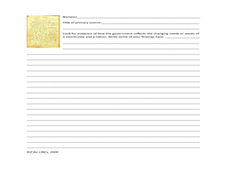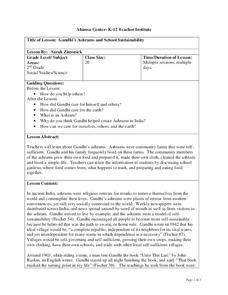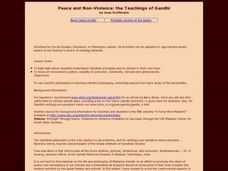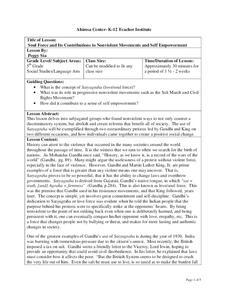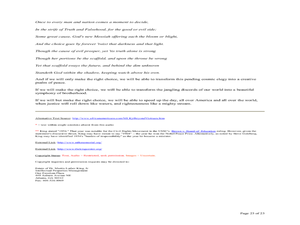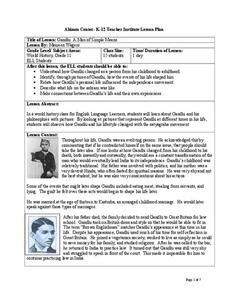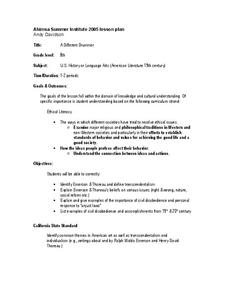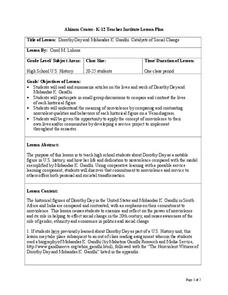Penguin Books
A Teacher's Guide to the Signet Classics Edition of Walden and "Civil Disobedience" by Henry David Thoreau
According to Henry David Thoreau, every citizen must object to unjust laws. The teacher's guide to Thoreau's "Civil Disobedience" begins with a detailed essay synopsis to help readers understand Thoreau's rationale in the challenging...
Curated OER
Towards Separation of Church and State in Gloucester
Explore New England government in the 1700's with your class. They will identify historical documents as primary or secondary sources, then read and discuss the significance of these documents as they relate to the "freedom of religion"...
Curated OER
Gandhi's Ashrams and School Sustainability
Explore philosophy and religion by researching Gandhi. Lead your young students to investigate the life and accomplishments of Mahatma Gandhi by reading the assigned text. Your class will define sustainability and create a sustainable...
K20 LEARN
Oklahoma and Segregation
It was not just the states of the Deep South that practiced segregation. Young historians investigate the history of segregation and desegregation in Oklahoma. They begin by reading, annotating, and analyzing an article about the impacts...
K20 LEARN
Power to the People
Black berets, black leather jackets, raised black fists, chants of "Power to the People!" These are the images that many associate with the Black Panther Party. Often forgotten are the programs the party created during the Civil Rights...
Curated OER
Seeking Civil Rights
Students explore the impact of the Plessy v. Ferguson case. In this social justice lesson, students examine the case, Jim Crow laws, and non-violent forms of protest. Students write essays to persuade the government regarding unjust laws.
Curated OER
Peace and Non-Violence: the Teachings of Gandhi
Students study the Gandhian philosophy. They define certain elements such as power, beauty and discuss what they know about the struggle for independence in India. Finally students collaborate to discuss Gandhian principles to extend...
Curated OER
Soul Force and Its Contributions to Nonviolent Movements and Self Empowerment
Fifth graders explore the concept of Satyagraha. In this nonviolent resistance lesson, 5th graders listen to a lecture about Gandhi's teachings and determine how the soul force contributes to a sense of self empowerment.
Curated OER
Muhammad Ali and his Vietnam War Resistance: Defining Nonviolent Action through Gandhi and King
Pupils research Muhammad Ali's act of civil disobedience. In this civil disobedience lesson, students research Ali's defiance of the Vietnam War draft and compare his reasoning to Martin Luther King's thoughts on the war. Pupils debate...
Curated OER
What is the Role of Civil Disobedience Today?
Students examine the meaning and use of civil disobedience. They decide whether civil disobedience is a viable form of protest in contemporary times after studying the acts of Rosa Parks.
Curated OER
Ahimsa as a Moral Force
Students explore the concept of Ahimsa. In this peace and tolerance lesson, students discuss Gandhi's application of Ahimsa and Satyagrah as they view the motion picture titled, "Gandhi." Students also discuss how effective Gandhi's...
Curated OER
Committing to Nonviolence: A Lesson from Viva La Causa
Students examine the social change movements of the American 20th century. In this nonviolence lesson, students research the work of Mahatma Gandhi, Martin Luther King, Jr., and Caesar Chavez. Students compare and contrast the social...
Curated OER
The Power of Nonviolent Struggle
Students identify how Mohandas Gandhi developed a nonviolent crusade for justice. In this nonviolent protest instructional activity, students watch segments of a documentary about Gandhi's reaction to imperialism in India. Students write...
Curated OER
Gandhi on Poverty, Violence, and Well-Being of All
Eighth graders explore the concept of Sarvodaya. In this nonviolent resistance lesson, 8th graders listen to a lecture about Gandhi's teachings and determine how poverty is a form of violence.
Curated OER
The Power of Autobiographical Writing
Students explore the concept of injustice. In this nonviolent resistance lesson, students discuss how autobiographical writing may be used to promote justice. Students read an excerpt from Gandhi's autobiography and determine how his...
Curated OER
Gandhi: A Man of Simple Means
Eleventh graders examine the life of Mohandas Gandhi. In this Gandhi instructional activity, 11th graders listen to their instructor present a lecture regarding the details of the Gandhi's life and respond to the provided discussion...
Curated OER
American Revolution: Attempting to Resolve Disputes by Communication
Students study conflicts over taxation. In this American Revolution lesson, students research the taxes imposed on the colonists by the British and determine how the colonists attempted to abolish the taxes through non-violent protests....
Curated OER
Free India: Resisting British Rule in India
Students explore the impact of nonviolence during Gandhi's Free India movement. In this World History lesson, students complete several activities including research, class discussions and a multimedia project, all centered around Gandhi.
Curated OER
A Different Drummer
Eighth graders investigate philosophy and meditation techniques by discussing Emerson and Thoreau. In this philosophical traditions activity, 8th graders identify the men Ralph Waldo Emerson and Henry David Thoreau, their work, and...
Curated OER
Unit on Gandhi and Ahimsa
Students explore the history of Gandhi and his viewpoint and example of nonviolence. In this World History lesson, students complete numerous research assignments and activities over the course of nine lessons to expand their knowledge...
Curated OER
Nonviolence as a Tool for Change Lesson 1
Students examine voting rights in the South during the 1950s and 1960s. In this civil rights lesson, students examine legal rights and the opportunity to cast votes. Students research primary documents regarding the topic and share their...
Curated OER
The March from Selma to Montgomery
Students examine voter discrimination. In this Civil Rights lesson, students watch segments of "Eyes on the Prize" and discuss the organization of the march from Selma to Montgomery. Students conduct interviews to learn personal stories...
Curated OER
Dorothy Day and Mohandas K. Gandhi: Catalysts of Social Change
Students explore how Dorothy Day and Mohandas Gandhi were leaders for social change. In this history lesson plan, students analyze the impact of these two leaders through several activities and group assignments.
Curated OER
GANDHI'S INDIA
Students describe key events in the life of Gandhi. They determine why knowledge of geography is necessary to understand the history of the people in a place or region. They write a summary of how the events in Gandhi's life,...



